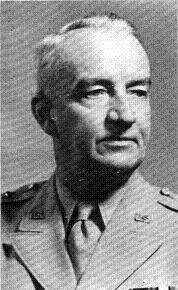![]() The Pacific War Online Encyclopedia
The Pacific War Online Encyclopedia
|
| Previous: Efate | Table of Contents | Next: Eijo Class, Japanese Minelayers |

U.S. Army. Via Mayo (1974)
Eichelberger was born in Urbana, Ohio, and attended Ohio
State University for two years (1905-1906) before attending West
Point and graduating 68th out of a class of 103 in 1909. He served
in the American
Southwest and was in training
and staff positions during the
First World War. He was the operations officer of the Siberian Expedition of 1918,
where he gained insight into the discipline and tactical doctrine of the Japanese Army. Later he was
posted to the Philippines
and Tientsin. A 1926
graduate of the Command and General Staff School, he also attended
the Army War College, graduating in 1930.
Eichelberger was the superintendent of West Point at the
outbreak of war. Marshall
considered him an excellent training officer and used him in that
capacity from March to October 1942, training 77 Division.
Eichelberger
then took command of I Corps in Australia, where MacArthur advised
him to "pay [his] respects to the Australians and then have
nothing further to do with them" (Larrabee 1987). Eichelberger
ignored this advice, setting up his office in the Rockhampton city hall and making a point of
working closely with the mayor to ensure amicable relations
between the American troops and Australian civilians. He was
solicitous of his men: When his wife read an Associated Press
article describing a "tall, gray-haired general" making a
Christmas visit to a hospital
and telling the men "Good morning, lads. I only hope you will all
be home next Christmas", she knew it was her husband. No other
U.S. general called his enlisted men "lads."
Eichelberger led
his corps into action in New Guinea, breaking the
stubborn Japanese defenses at Buna
in late 1942. In September 1944, Eichelberger became commander of
8 Army and led
the army ashore at Leyte to
reinforce Krueger's 6 Army. He
directed most of the battle of Luzon,
including the liberation of Clark
Field and Manila. He
continued directing operations in the southern Philippines for the
remainder of the war, conducting a tactically brilliant if strategically questionable
campaign on MacArthur's orders.
Following the surrender,
Eichelberger's 8 Army became the occupying force in Japan.
Eichelberger returned to the United States in
September 1948, and was promoted to full general on retirement in
1954.
Favorable press coverage of Eichelberger irritated MacArthur sufficiently that Eichelberger was essentially put on the shelf for over a year following the Buna victory. Later in the war, MacArthur hinted to Eichelberger that he was considering having him replace Sutherland as MacArthur's chief of staff, a move that would have allowed MacArthur to capitalize on Eichelberger's abilities while further limiting his publicity. Eichelberger was everything that MacArthur was not, including publicity shy, and as a result his tremendous contributions in New Guinea and in other operations in 1944-1945 remain largely unknown to the American public today.
Eichelberger's greatest weakness was that he expected
others to be be as warm, honest and open as he was with them, and
when they were not, he became resentful and suspicious. This was a
significant liability in the world of MacArthur's headquarters.
MacArthur himself played Eichelberger against Krueger, on the
theory that the rivalry would prompt each to exert himself to the
limit.
| 1886-3-9 |
Born in Urbana, Ohio |
|
| 1905 to
1906 |
Attends Ohio State University |
|
| 1907 to 1909 |
Attends West Point,
graduating 68th in a class of 103. |
|
| 1918-9 to 1919 |
Operations Officer, American
Expeditionary Force, Siberia |
|
| 1926 |
Graduates from Command and
General Staff School |
|
| 1930 |
Graduates from Army War
College |
|
|
1935-7-3
|
Secretary to the General Staff, War Department | |
|
1938-11-9
|
Colonel
|
Commanding Officer, 30 Regiment |
| 1940-11-18 to
1942-1-11 |
Brigadier General |
Superintendent, West Point |
| 1942-3-25 |
Major
General |
Commanding General, 77 Division |
| 1942-6-22 |
Commanding General, I Corps | |
| 1942-10-15 |
Lieutenant
General |
|
| 1944-9-7 to 1948 |
Commanding General, 8 Army | |
| 1945 to 1948 |
Commander in Chief Allied
Land Forces of Occupation, Japan |
|
| 1954 |
General |
Retires |
| 1961-9-26 |
Dies in Asheville, North
Carolina |
References
generals.dk (accessed 2007-11-1)
The Pacific War Online Encyclopedia © 2007-2008, 2012, 2016 by Kent G. Budge. Index